因为BEC V 失分过多
托业两次成绩差了300分
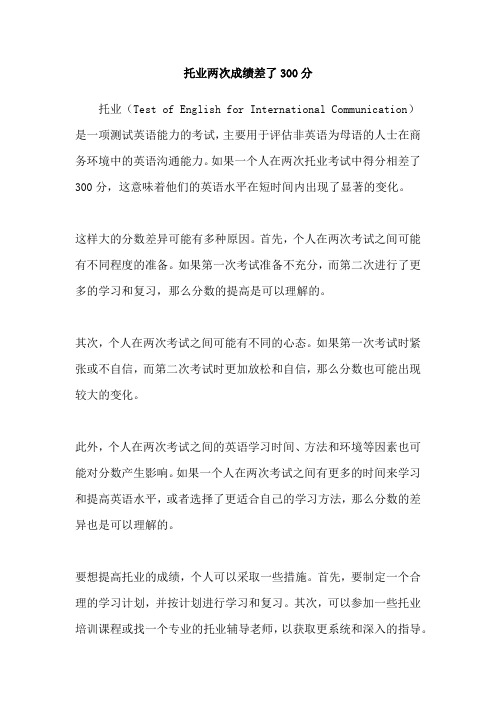
托业两次成绩差了300分
托业(Test of English for International Communication)
是一项测试英语能力的考试,主要用于评估非英语为母语的人士在商务环境中的英语沟通能力。
如果一个人在两次托业考试中得分相差了300分,这意味着他们的英语水平在短时间内出现了显著的变化。
这样大的分数差异可能有多种原因。
首先,个人在两次考试之间可能有不同程度的准备。
如果第一次考试准备不充分,而第二次进行了更多的学习和复习,那么分数的提高是可以理解的。
其次,个人在两次考试之间可能有不同的心态。
如果第一次考试时紧张或不自信,而第二次考试时更加放松和自信,那么分数也可能出现较大的变化。
此外,个人在两次考试之间的英语学习时间、方法和环境等因素也可能对分数产生影响。
如果一个人在两次考试之间有更多的时间来学习和提高英语水平,或者选择了更适合自己的学习方法,那么分数的差异也是可以理解的。
要想提高托业的成绩,个人可以采取一些措施。
首先,要制定一个合理的学习计划,并按计划进行学习和复习。
其次,可以参加一些托业培训课程或找一个专业的托业辅导老师,以获取更系统和深入的指导。
此外,多进行模拟考试,熟悉考试的形式和要求,并针对性地改进自己的弱点。
总的来说,托业成绩差了300分是一个较大的差距,但可以通过积极的学习和准备来提高成绩。
重要的是要找到自己的问题所在,并采取相应的措施加以解决,以便在下一次考试中取得更好的成绩。
bec中级成绩等级c什么水平
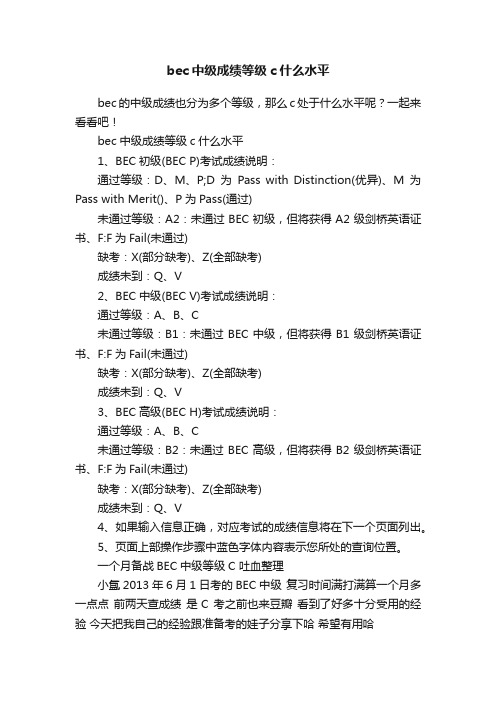
bec中级成绩等级c什么水平bec的中级成绩也分为多个等级,那么c处于什么水平呢?一起来看看吧!bec中级成绩等级c什么水平1、BEC初级(BEC P)考试成绩说明:通过等级:D、M、P;D为Pass with Distinction(优异)、M为Pass with Merit()、P为Pass(通过)未通过等级:A2:未通过BEC初级,但将获得A2级剑桥英语证书、F:F为Fail(未通过)缺考:X(部分缺考)、Z(全部缺考)成绩未到:Q、V2、BEC中级(BEC V)考试成绩说明:通过等级:A、B、C未通过等级:B1:未通过BEC中级,但将获得B1级剑桥英语证书、F:F为Fail(未通过)缺考:X(部分缺考)、Z(全部缺考)成绩未到:Q、V3、BEC高级(BEC H)考试成绩说明:通过等级:A、B、C未通过等级:B2:未通过BEC高级,但将获得B2级剑桥英语证书、F:F为Fail(未通过)缺考:X(部分缺考)、Z(全部缺考)成绩未到:Q、V4、如果输入信息正确,对应考试的成绩信息将在下一个页面列出。
5、页面上部操作步骤中蓝色字体内容表示您所处的查询位置。
一个月备战BEC中级等级C 吐血整理小氲2013年6月1日考的BEC中级复习时间满打满算一个月多一点点前两天查成绩是C 考之前也来豆瓣看到了好多十分受用的经验今天把我自己的经验跟准备考的娃子分享下哈希望有用哈关于教材我其实在寒假就买了厚厚一撂资料淘宝买的 70块钱 11本书还送好多电子资料虽然我看都没看分别是《新编剑桥商务英语(中级)学生用书(第三版)》经济科学出版社《新编剑桥商务英语(中级)同步辅导(第三版)》经济科学出版社《剑桥BEC真题集第2辑》(中级) 人民邮电出版社《剑桥BEC真题集第3辑》(中级) 人民邮电出版社《剑桥BEC真题集第4辑》(中级) 人民邮电出版社《剑桥商务英语证书(中级)模拟测试题册》人民邮电出版社《新东方剑桥商务英语中级词汇精选》群言出版社《新编剑桥商务英语口试必备手册》(修订版)(中、高级)经济科学出版社《剑桥商务英语证书考试(中级)听力必备》国际文化出版公司《剑桥商务英语证书考试(中级)口语必备》国际文化出版公司《剑桥商务英语证书考试(中级)写作必备》国际文化出版公司但是我这个人假期也不会有太多心思在看书上的快递到家后就撕开包装用目光膜拜了一下永远置之不理了关于复习后来开学了也啃呲啃呲背到学校宿舍的书架上了当时宿舍的妹子在备战全国计算机二级我想想反正6月1日考的不急悠哉悠哉的但因为我六级考得也不是很高 538 还是煞有其事地找考过的学长煞有其事地问三个月备战BEC中级时间来得及么学长说肯定来得及我就又开始悠哉悠哉了等到还有一个多月我急了就把那些书翻开来做计划(我这人认真起来特别爱给自己定计划平时只要时间空的就往图书馆奔在这里插一句我特别喜欢图书馆的气味不仅仅是感官上带来的东西因为学长说了听力是最难的所以我计划是先把《剑桥商务英语证书考试(中级)听力必备》听完了有的听不明白我就多听几遍我觉得阅读倒没什么难度关于《新编剑桥商务英语(中级)学生用书(第三版)》我一开始还蛮认真地一个单词一个单词(因为我也看过别人的经验文都说课本要吃透地查字典后来也没耐心了十几个单元呢就又束之高阁了《新编剑桥商务英语(中级)同步辅导(第三版)》我就翻了几页放在图书馆不知道被谁拿走了写作也要早看因为它有好多格式什么电子邮件便条啊什么的书里讲的还蛮详细的口语必备是稍后开始看的天天背那时候按照计划我这些分块复习进行的差不多的时候特别是听力我就开始做真题了第一份真题是练练手的后来的就开始计时间然后开始很仔细的对答案找错因因为我觉得真题很重要做十份模拟不如一份真题(这是我多年学英语的经验想当年中考英语就扣2分哪越活越回去了) 至于真题中的作文部分因为《剑桥商务英语证书考试(中级)写作必备》没看完我也不会什么格式所以都没做就后来临近考试练了几回所以我做得完整的真题有没有几套练习册我翻都没翻主要是后来真题都来不及做了哪还有空搭理它啊陈小慰的《新编剑桥商务英语口试必备手册》(修订版)(中、高级)都说很好但是它的大部头吓到我了就把《剑桥商务英语证书考试(中级)口语必备》看看背背说到单词本我也没看我最不喜欢背英语单词和五言律诗考四六级的时候也木有背其实我买的一大撂里我真正用到的也就六本分别是《剑桥BEC真题集第2辑》(中级) 人民邮电出版社《剑桥BEC真题集第3辑》(中级) 人民邮电出版社《剑桥BEC真题集第4辑》(中级) 人民邮电出版社《剑桥商务英语证书考试(中级)听力必备》国际文化出版公司《剑桥商务英语证书考试(中级)口语必备》国际文化出版公司《剑桥商务英语证书考试(中级)写作必备》国际文化出版公司关于考试听力部分真的只能用一个字形容快到后来我直接是看提问猜答案了估计这部分失分会很多不怕神一样的对手就怕猪一样的队友口试部分除了回答考官的问题和自己就一个话题陈述一段话还要听partner的陈述并且提问但是最通用的一句话就是 what is the most important ....?最后一个部分是两个人互相对话但是我觉得好的partner是挺有利的但是影响也不是很大只要你够强大bec中级商务英语口语:另一张绿色便条纸SCENE① A 加州的资讯王办公室【另一张绿色便条纸】Zina: Dave! Look at this!吉娜:戴夫!你看这个!Dave: You don't have to yell, Zina. I'm just one 1) cubicle away.戴夫:你不必用喊的,吉娜。
考试失分原因改进措施

考试失分原因改进措施考试失分的原因和改进措施因人而异,因为每个人的学习和考试情况都有所不同。
以下是一些建议,您可以根据您的具体情况进行调整:1. 审题不清晰:- 原因:可能是因为匆忙阅读题目,没有理解清楚要求。
- 改进措施:在开始答题之前,仔细阅读每个题目,确保理解题目的关键要求。
可以在纸上标注关键词,确保自己明白问题的本质。
2. 知识点不牢固:- 原因:未能充分掌握考试范围内的知识点。
- 改进措施:提前规划学习时间,制定合理的学习计划,注重基础知识的学习和记忆。
使用各种学习资源,包括教科书、参考书、在线教育平台等。
3. 时间管理不当:- 原因:在某些题目上花费过多时间,导致其他题目无法完成。
- 改进措施:在考试前进行模拟考试,提高自己的时间管理能力。
了解每个题目的分值,合理分配时间。
如果在某个问题上卡壳,可以先跳过去,等完成其他题目后再回来解答。
4. 考试焦虑:- 原因:考试压力过大,导致紧张和焦虑。
- 改进措施:学习前采用一些放松技巧,如深呼吸、冥想等。
保持良好的作息,确保充足的睡眠。
在考试之前进行适当的复习,增加信心感。
5. 粗心大意:- 原因:在计算或书写时犯了一些粗心错误。
- 改进措施:在完成每一步计算或写作时都要仔细检查。
可以先快速完成一遍,然后再仔细检查,确保没有错误。
6. 缺乏练习:- 原因:没有足够的练习,不熟悉考试的题型和难度。
- 改进措施:多做模拟试卷和往年考题,了解考试的出题规律。
通过练习,提高对各类问题的解决能力。
总体而言,了解自己在考试中的弱点,有目的地进行有针对性的学习和练习,以及改进时间管理和放松技巧,都是提高考试表现的有效途径。
学生英语失分对策分析报告

学生英语失分对策分析报告引言英语是当今世界上最主要的通用语言之一,对于学生来说,掌握好英语技能不仅有助于学术提升,还能拓宽国际交流的机会。
然而,很多学生在英语学习中存在着失分现象,这对他们的学业发展和个人成长都带来了一定的困扰。
本报告旨在分析学生英语失分的原因,并提供相应的对策,以帮助学生在英语学习中取得更好的成绩。
失分原因分析1. 词汇和语法掌握不牢固词汇和语法是英语学习的基础,但很多学生在背单词和理解语法规则上存在困难。
这导致他们在听、说、读、写各个方面都出现了许多错误。
比如,在写作时,学生经常犯错的地方是词汇的选择和语法错误。
2. 阅读理解能力不足阅读理解是英语考试中常见的一种题型,但很多学生对于长篇阅读文章的理解能力不足。
他们往往读不懂文章中的关键信息,导致回答问题时出现错误或无法回答。
3. 听力技巧不到位听力是许多学生难以适应的一项技能,主要原因是快速理解口语表达和区分不同语速和口音。
学生在听力考试中往往会错过重要的信息,导致答案不准确。
4. 写作表达能力不强写作是展示学生英语能力的重要方式,但很多学生在写作时表达不准确、逻辑混乱或者语句结构不完整。
这导致他们无法准确表达自己的观点,丧失了分数获取的机会。
对策建议1. 加强词汇和语法学习学生应该通过背单词、阅读英语文章、参加语法讲解等方式来加强词汇和语法的学习。
建议使用各类在线学习平台、参加英语角等进行练习。
2. 提高阅读理解能力提高阅读理解能力需要学生多读英语原版书籍、报纸、杂志等,并注意阅读文章时的重点把握和理解方法。
学生还可以通过参加阅读讨论小组、做阅读练习等增强自己的阅读能力。
3. 训练听力技巧学生可通过听英语广播、听原版英语歌曲、看英语电影等提高自己的听力水平。
此外,可以多进行听力模拟考试,并针对性地进行听写练习,提高对口语表达的敏感度和理解能力。
4. 提升写作表达能力学生可以多写作文、读范文,积累写作表达的经验。
同时也可以参加写作训练班或找老师指导,提高自己的写作水平。
英语反思失分原因
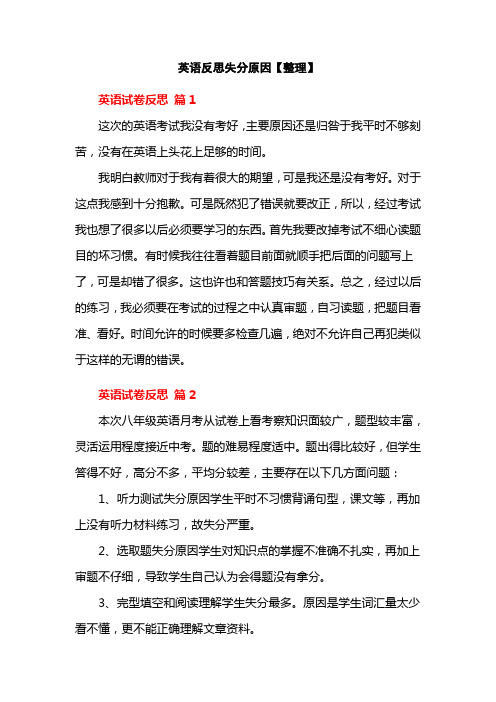
英语反思失分原因【整理】英语试卷反思篇1这次的英语考试我没有考好,主要原因还是归咎于我平时不够刻苦,没有在英语上头花上足够的时间。
我明白教师对于我有着很大的期望,可是我还是没有考好。
对于这点我感到十分抱歉。
可是既然犯了错误就要改正,所以,经过考试我也想了很多以后必须要学习的东西。
首先我要改掉考试不细心读题目的坏习惯。
有时候我往往看着题目前面就顺手把后面的问题写上了,可是却错了很多。
这也许也和答题技巧有关系。
总之,经过以后的练习,我必须要在考试的过程之中认真审题,自习读题,把题目看准、看好。
时间允许的时候要多检查几遍,绝对不允许自己再犯类似于这样的无谓的错误。
英语试卷反思篇2本次八年级英语月考从试卷上看考察知识面较广,题型较丰富,灵活运用程度接近中考。
题的难易程度适中。
题出得比较好,但学生答得不好,高分不多,平均分较差,主要存在以下几方面问题:1、听力测试失分原因学生平时不习惯背诵句型,课文等,再加上没有听力材料练习,故失分严重。
2、选取题失分原因学生对知识点的掌握不准确不扎实,再加上审题不仔细,导致学生自己认为会得题没有拿分。
3、完型填空和阅读理解学生失分最多。
原因是学生词汇量太少看不懂,更不能正确理解文章资料。
4、补全对话失分因为学生不能按平时的指导去做,把握不住做题要领。
5、动词运用题学生没有到达灵活运用,平时练得少。
6、写作潜力太差,平时练得少,教师指导的也不够。
今后的教学我想从以下几方面改善:1、提高课堂教学质量,备课必须要充分,教学方法灵活多样。
2、加强课下对学生的追踪力度,采用“兵教兵”“兵追兵”。
3、加大对重点知识的练习力度,练得学生一看就明白答案。
4、完型填空和阅读理解,补全对话平时多加强对学生的做题指导,主要是方法指导。
每一天让学生背十个单词,翻译五个句子。
5、写作方面多练多批多改。
6、对学生进行做题技巧训练,避免因粗心错题。
英语试卷反思篇3几天前进行的英语月考缓缓落下帷幕,当那份沉甸甸的试卷落在课桌上时,我急忙翻看分数好似饥饿已久的人看到能够挽救自己生命的面包。
如何提高商务英语考试成绩
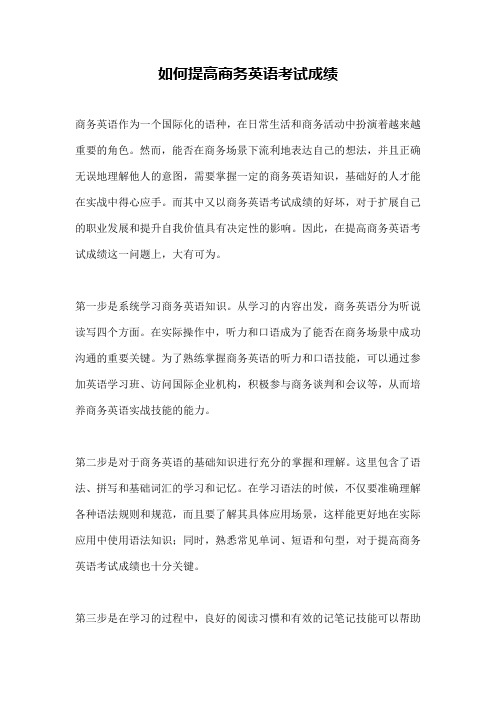
如何提高商务英语考试成绩商务英语作为一个国际化的语种,在日常生活和商务活动中扮演着越来越重要的角色。
然而,能否在商务场景下流利地表达自己的想法,并且正确无误地理解他人的意图,需要掌握一定的商务英语知识,基础好的人才能在实战中得心应手。
而其中又以商务英语考试成绩的好坏,对于扩展自己的职业发展和提升自我价值具有决定性的影响。
因此,在提高商务英语考试成绩这一问题上,大有可为。
第一步是系统学习商务英语知识。
从学习的内容出发,商务英语分为听说读写四个方面。
在实际操作中,听力和口语成为了能否在商务场景中成功沟通的重要关键。
为了熟练掌握商务英语的听力和口语技能,可以通过参加英语学习班、访问国际企业机构,积极参与商务谈判和会议等,从而培养商务英语实战技能的能力。
第二步是对于商务英语的基础知识进行充分的掌握和理解。
这里包含了语法、拼写和基础词汇的学习和记忆。
在学习语法的时候,不仅要准确理解各种语法规则和规范,而且要了解其具体应用场景,这样能更好地在实际应用中使用语法知识;同时,熟悉常见单词、短语和句型,对于提高商务英语考试成绩也十分关键。
第三步是在学习的过程中,良好的阅读习惯和有效的记笔记技能可以帮助我们更好地理解商务英语材料和保持笔记的准确性和完整性。
尤其是听力和口语技能的实战教学中,每次上完课之后反思课堂内容,经常地进行笔记的整理和总结可以在考试的时候起到很好的协助作用。
最后,对于商务英语考试成绩的提高,做到不断地练习和获得反馈是最重要的因素之一。
练习可以帮助我们验证自己的实力是否有提高,同时还可以发现自己在实际应用中的疑惑和不足。
而获得反馈则是检验学习成果和发现学习中差错的有效方法,通过不断地分析和反思,能够更好地发现自己的优势和劣势,并进行相应的改进和优化。
总之,需要多角度多方面进行学习和练习,才能帮助我们在商务英语考试中取得好的成绩。
不仅要提高技能,还要增强自信心,善于合理规划和安排学习计划,从而顺利地实现自己的目标和期望。
关于BEC中级失败与成功的心得

关于BEC中级失败与成功的心得第一篇:关于BEC中级失败与成功的心得用最简单的排版和最简练的说辞来谈谈我的两次BEC Vantage之旅吧~~ 我是国贸专业的学生,大三上学期就有一开剑桥商务英语的课程,当时还想着,蛮等这学期学了之后,再报名考试,或许通过率会更大,but,it proved wrong!!平时上课不认真听,作业也没做,心不在焉,因为之前的四六级都是飘飘乎过的,以为中级也可以耍耍小聪明!错了错了,后来我知道这一切都是错的!!于是乎,大三下学期就报了当地的BEC培训班,老师都很好很负责,就是上课强度很大,由于之前没有参加过这些考试的培训班,完全不能理解那些为了考四六级去培训的同学的痛楚!强度大了,课上的集中力也不是很够。
上学期学的BEC完全就等于没学,OK,那现在重新开始了吧。
又遇到接受能力,还好这些也都过得去,那就拼阅读和听力了,刚开始入门的确有点小困难,不过关于BEC的一些词汇,还是需要靠平时做题积累的。
失败乃成功之母Failure is the mother of success.现在想来,第一次考BEC的备战情况还算良好,因为有参加培训班,有做题,但是却有点依赖培训的意思,以为,报了培训就有了“必过”的保证!事实证明又是错的!就因为我的侥幸心理,导致了这次考试的失败!一场考试下来,就听力毁了,考完电话妈咪,说,要是这次没过,定是听力捣的鬼!因为我的口语自学习英语以来都算还不错的水平,再加上BEC的口语其实并不难,只要你开口说,没什么不过的!再者,那天考口语,我非常流利的表达也赢得了两位考官对我的赞赏~只是笔试一直都是我的弱项~!…………第一次的备考,经验就是,完全错误!都是依赖培训和自己的心态作祟!得知B1的那一刻,直接没有心情赴约了。
难过到哭了一阵就完全好啦~其实,考什么试不都看心态嘛~后来领取了成绩单,果不其然,我的听力在weak那栏~speaking最高,writing和reading差不多。
英语作文失分多的原因分析与反思

英语作文失分多的原因分析与反思The ability to write effective English essays is a critical skill for students in academic settings. However, many students often struggle to achieve high scores on their English essays despite their best efforts. In this essay, I will analyze the key reasons behind this issue and provide some reflections on how to address these challenges.One of the primary reasons for low scores on English essays is a lack of strong writing skills. Many students, even those who are proficient in the English language, may not have developed the necessary skills to organize their thoughts, construct coherent paragraphs, and present their arguments in a clear and compelling manner. This can be particularly challenging for students who are non-native English speakers or those who have not had extensive practice in academic writing.Another factor that contributes to low scores on English essays is a failure to fully understand the assignment prompt or the specific requirements of the essay. Students may misinterpret the question,focus on irrelevant information, or fail to address all the key points that the prompt is asking them to cover. This can result in essays that are off-topic, lack focus, or do not adequately address the core aspects of the assignment.Poor time management is also a common issue that can lead to lower scores on English essays. Many students struggle to allocate their time effectively, leading to rushed writing, incomplete research, or a lack of proofreading and editing. This can result in essays that are poorly structured, contain grammatical and spelling errors, or lack the depth and nuance that is expected in academic writing.Furthermore, a lack of familiarity with the conventions and expectations of academic writing can also contribute to lower scores on English essays. Students may not be aware of the appropriate tone, style, and format required for different types of essays, or they may not have a strong grasp of the citation and referencing conventions that are expected in academic work.Finally, personal factors such as anxiety, lack of confidence, or a general disinterest in the subject matter can also play a role in the quality of a student's English essay. These factors can lead to a lackof engagement with the writing process, a reluctance to take risks or experiment with different approaches, and a general sense of discomfort or frustration that can negatively impact the final product.To address these challenges and improve performance on English essays, students can adopt a range of strategies. Firstly, it is essential to develop strong writing skills through regular practice and feedback. This may involve seeking out resources such as writing workshops, tutoring, or online writing guides to help improve their techniques.Secondly, students should carefully read and analyze the assignment prompt, ensuring that they fully understand the expectations and requirements before they begin writing. They should also take the time to plan and organize their essay, considering the structure, flow, and key arguments they want to make.Time management is also crucial, and students should allocate sufficient time for research, writing, and editing to ensure that their essay is of high quality. Additionally, they should familiarize themselves with the conventions and expectations of academic writing, such as the appropriate tone, style, and citation formats.Finally, students can also work on building their confidence and overcoming any personal barriers that may be impacting their writing. This may involve seeking support from teachers, counselors, or peers, and practicing strategies for managing anxiety and maintaining motivation.In conclusion, the reasons for low scores on English essays are multifaceted and can be attributed to a range of factors, including a lack of strong writing skills, a failure to understand assignment prompts, poor time management, a lack of familiarity with academic writing conventions, and personal factors such as anxiety and lack of confidence. By addressing these challenges through a combination of targeted strategies and ongoing practice, students can improve their performance on English essays and achieve greater success in their academic pursuits.。
英语作文丢分原因及解决方法

英语作文丢分原因及解决方法Losing points in English compositions is a common problem for many students.在英语作文中丢分是许多学生都会遇到的问题。
One reason for this might be a lack of clear organization and structure in the writing.一个原因可能是写作中缺乏清晰的组织和结构。
Another potential issue is a limited vocabulary and lack of variety in sentence structure.另一个潜在的问题是词汇量有限,句子结构缺乏变化。
Furthermore, grammatical errors, such as subject-verb agreement and verb tense consistency, can also contribute to point deductions. 此外,语法错误,如主谓一致和动词时态一致性,也可能导致扣分。
Moreover, failing to address the prompt or fully develop the topic can lead to a loss of points.此外,未能解决问题或充分发展主题也会导致扣分。
Finally, lack of coherence and cohesion, as well as poor use of transition words, can make the writing difficult to follow and impact the overall score.最后,缺乏连贯性和衔接性,以及对过渡词的使用不当,会使写作难以理解,影响总体得分。
To address these issues, students should focus on improving their writing organization by using outlines and planning their essays before they start writing.为了解决这些问题,学生应该专注于通过使用提纲,在开始写作之前先规划好文章结构,以改善他们的写作组织。
英语失分原因和改进措施

英语失分原因和改进措施
英语失分的原因可能有很多,具体情况因人而异。
首先,可能是因为缺乏足够的词汇量和语法知识,导致在阅读、写作和听力等方面出现困难。
另外,可能是因为缺乏练习和应试技巧,导致在考试中不能有效地应对各种题型。
此外,也有可能是缺乏对英语文化和背景知识的了解,导致在理解和表达上出现偏差。
为了改进英语成绩,可以采取一些措施。
首先,建议加强词汇和语法的学习,可以通过背单词、阅读英文书籍和文章来扩大词汇量,通过做语法练习来加强语法知识。
其次,建议多进行听力和口语练习,可以通过听英文广播、看英文电影和与外国人交流来提高听力和口语能力。
此外,还可以通过写作练习来提高表达能力,可以多写作文、作文和日记等来提高写作水平。
最后,也建议多了解英语国家的文化和习俗,可以通过阅读相关书籍和了解当地的风土人情来增进对英语文化的了解。
总的来说,提高英语成绩需要系统性的学习和练习,同时也需要对英语文化有一定的了解。
通过持之以恒的努力和不断的实践,相信英语成绩一定会有所提高。
英语试卷分析失分原因和改进措施

分析英语试卷失分原因可以从以下几个方面考虑:
1.词汇理解不够:有些单词、短语、句子可能是学生之前没有接触过的,或者是语境不熟悉。
这时候,学生需要扩充词汇量,多进行语境理解训练。
2.语法错误:语法错误可能会影响学生的写作和阅读理解能力,导致失分。
建议学生多加练习语法知识,并注意在写作中尽量避免语法错误。
3.阅读理解不够透彻:学生可能在阅读时没有完全理解文章的内容,或者对文章中的某些句子和词语产生了歧义。
建议学生在阅读时多注意上下文语境,尝试在不理解的地方使用上下文线索进行推断。
4.写作能力不足:写作能力是英语学习中非常重要的一部分,如果学生的写作表达不够清晰、语言组织不够合理,也会影响其得分。
建议学生多进行写作练习,并学习一些写作技巧,例如如何组织文章结构,如何用好过渡词等。
改进措施方面,可以从以下几个方面考虑:
1.扩充词汇量:学生可以通过背单词、看英文原版书籍等方式扩充自己的词汇量。
2.加强语法训练:学生可以通过做语法练习、多读一些语法书籍等方式加强自己的语法知识。
3.多做阅读理解题目:学生可以通过做阅读理解练习题、阅读英文文章等方式提高阅读理解能力。
4.多进行写作练习:学生可以通过写作日记、作文等方式进行写作训练,同时注意学习一些写作技巧,例如如何组织文章结构,如何用好过渡词等。
如何确保BEC高级阅读不丢分
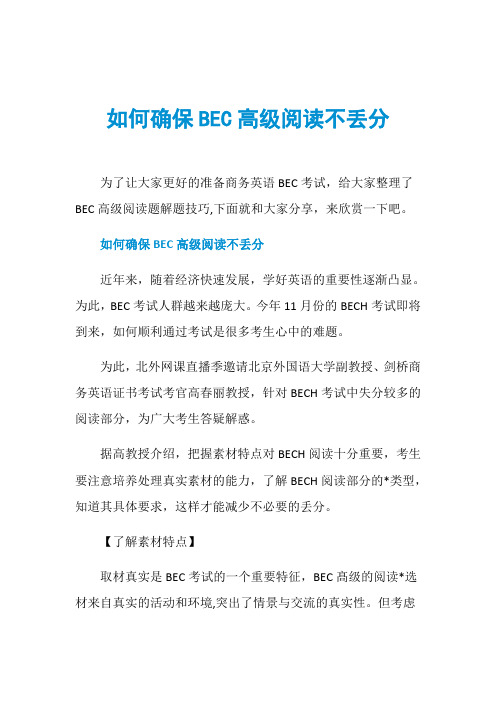
如何确保BEC高级阅读不丢分为了让大家更好的准备商务英语BEC考试,给大家整理了BEC高级阅读题解题技巧,下面就和大家分享,来欣赏一下吧。
如何确保BEC高级阅读不丢分近年来,随着经济快速发展,学好英语的重要性逐渐凸显。
为此,BEC考试人群越来越庞大。
今年11月份的BECH考试即将到来,如何顺利通过考试是很多考生心中的难题。
为此,北外网课直播季邀请北京外国语大学副教授、剑桥商务英语证书考试考官高春丽教授,针对BECH考试中失分较多的阅读部分,为广大考生答疑解惑。
据高教授介绍,把握素材特点对BECH阅读十分重要,考生要注意培养处理真实素材的能力,了解BECH阅读部分的*类型,知道其具体要求,这样才能减少不必要的丢分。
【了解素材特点】取材真实是BEC考试的一个重要特征,BEC髙级的阅读*选材来自真实的活动和环境,突出了情景与交流的真实性。
但考虑到考生中包括尚未有商务实践经验的在校学生,*一般要经过编辑处理以满足考试要求。
真实素材有以下一些特点:(1)与从事国际商务工作人们相关。
(2)不要求具有超过规定范围内*类型的专门商务知识3(3)不要求算术技巧。
(4)不要求熟悉英国文化或生活方式。
【提高考生处理真实素材的能力】高教授认为,对于考生,尤其是尚无商务工作经验的考生,扩大阅读量,培养商务语境下的思维和语言能力至关重要。
因此,考生要利用一切可能的机会为自己创造接触和熟悉商务英语的环境,才能逐步提高自己的语言交际能力。
【熟悉各类型*的具体要求】BEC高级阅读部分的*类型有各种类型的信函、备忘录、通知、时刻表,广吿、办公日记、说明书和制度、选自商务和一般报刊杂志的*、新闻报道、指南、手册和目录、公共信息和通知、商务计划、公司节选的报告等等。
信函类型*的具体要求是什么?(1)总体要求:能够看懂信函、传真、备忘录、电子邮件等。
(2)*环境:工作场所,如:办公场所、企业、工厂等。
(3)所需技能:能看懂大多数信函。
尽管可能不太理解用隐晦手法表现出来的一些细微的差别。
初中英语读写题的失分原因及教学建议

初中英语读写题的失分原因及教学建议(中英文版)Causes of Lost Points in Junior High English Reading and Writing Tests and Teaching Recommendations初中英语读写题失分原因及教学建议Many students struggle with losing points in English reading and writing tests during their junior high years. Several factors contribute to this issue, and it's essential to identify them to improve teaching strategies.许多学生在初中阶段的英语读写测试中常因失分而苦恼。
这个问题涉及多方面因素,我们必须识别这些因素,以便改进教学策略。
Inconsistent Vocabulary Mastery词汇掌握不牢固One significant reason for losing points is the inconsistent mastery of vocabulary. Students may find it challenging to understand the text or express their ideas fluently due to a limited vocabulary bank.失分的一个重要原因是词汇掌握的不一致性。
由于词汇量有限,学生可能会发现理解文本或流畅表达观点颇具挑战。
To address this, teachers should focus on expanding students' vocabulary by incorporating more reading materials and encouraging them to use new words in their writing.针对此问题,教师应通过增加阅读材料来扩大学生的词汇量,并鼓励他们在写作中运用新词汇。
克服BEC口试薄弱环节 学习有妙方2

克服BEC口试薄弱环节学习有妙方(2)
克服BEC口试薄弱环节学习有妙方
BEC口试占总成绩的25%,是非常重要的一个局部。
但要顺利冲过3分线也并不是一件容易的事,需要考生做足准备,智慧备考。
Cecily建议考生在备考时最好能够找到一个伙伴一起备考,并保证在备考期间每周有2小时以上的练习时间,熟悉对方的`语音语调和培养默契,这样在考试中能够缓解紧张情绪,提高口试的成功率。
如果不能在考前找到自己的伙伴,那么在考试现场临时配对后,也要注意和伙伴的前期沟通,建立起互相的信任感。
此外,考试中巧妙地运用连词也能获得考官的好印象。
Cecily 在多年的教学实践和口试考官中发现,按照中文的表述习惯,考生很少使用连词类来表示上下句或句群之间的关系,但是英文在长篇表述的时候很在意连接词的使用。
因此,在做陈述时建议考生要使用因果、转折、递进等连词,来表述句子之间的逻辑关系。
并且,考生最好使用清晰的first, second, in addition等表示顺序的词来请听者注意。
语主要因为阅读和英语作文的原因分析失分

语主要因为阅读和英语作文的原因分析失分全文共3篇示例,供读者参考篇1Why I Keep Losing Points on Reading and Writing AssignmentsAs a student, few things are more frustrating than putting in a ton of effort on an assignment only to get it back with a disappointing grade. Over the years, I've noticed a pattern - the assignments where I tend to lose the most points are reading comprehension tests and English writing compositions. At first, I chalked it up to those just being some of my weaker areas. However, after repeatedly struggling in those sections, I realized I needed to do a deep dive to truly understand why I was underperforming.The first culprit I identified was my lack of active reading skills. Too often, I would skim through reading passages rather than giving them my full attention. I'd miss out on key details, fail to analyze deeper meanings, and start zoning out partway through longer texts. It's no wonder my comprehension suffered – I simply wasn't reading closely and critically enough. To fix this,I've been practicing active reading techniques like taking notes, asking questions as I read, and periodically pausing to summarize what I've learned so far. It has been challenging to break my passive reading habits, but I can already tell it's paying dividends.Another big issue has been my difficulty with vocabulary and detecting things like tone, symbolism, and rhetorical devices in passages. My limited vocabulary knowledge makes it hard for me to fully grasp the nuances of what I'm reading, especially with dense, academic texts. I've started keeping a running vocabulary journal to learn new words, as well as closely studying examples to get better at identifying literary elements. It's a gradual process, but I'm determined to keep chipping away at it.Turning to my writing struggles, a major problem area has been my tendency to have disorganized, unfocused essays. I've gotten feedback that my pieces often lack a clear thesis, have poor transitions between ideas, and meander without making a cohesive point. I have a hard time imposing structure on my writing, which results in essays that read as a bunch of scattered thoughts rather than a tight, logical argument.To combat this, I've been using outlining as a prewriting technique to map out the key ideas and flow of my essays beforedrafting. I've also been studying model essays to analyze how the ideas are structured and linked together. While outlines can feel confining at times, I'm realizing how crucial they are for keeping my writing organized and preventing it from going off the rails.Another major pitfall in my writing is making grammatical and mechanical errors – things like incorrect punctuation, poor word choice, improper verb tense usage, and jarring shifts in voice or point of view. I have a bad habit of rushing through my writing process without doing a careful proofreading pass at the end. As a result, I end up with sloppy, error-riddled drafts that detract from the overall quality of my work. Lately, I've been implementing a policy of stepping away from essays for a day or two before doing a meticulous proofreading sweep. I catch so many more mistakes this way when I can look at my writing with fresh eyes.Developing my skills in areas like analysis, critical thinking, and argumentative writing has also been a huge challenge. My essays often get marked down for lacking in-depth analysis, failing to interpret evidence, and making unsupported claims instead of crafting nuanced, Evidence-based arguments. Quite frankly, I've struggled to elevate my writing beyond justsummarizing information into true scholarly discourse and rhetorical reasoning. I'm working on building this higher-order skill through close study of more advanced essays and articles to analyze how the writers make and support their claims. I'm also focusing on asking more probing questions as I read to push my analytical abilities.The bottom line is, I have some critical gaps in my foundational reading and writing abilities that have really held me back from performing at my full potential. Addressing these weaknesses won't happen overnight – it's going to take a lot of diligent practice over time. However, now that I've clearly identified my problem areas through this process ofself-reflection, I feel empowered to tackle them head-on through targeted strategies.I have to be honest, some of these new approaches I'm implementing, like active reading and outlining, have felt pretty tedious and unnatural at first. After breezing through so many assignments in the past, it's been a wake-up call realizing how much more conscious effort I need to put into these core skills. That said, I'm already seeing the payoff through improvements in my comprehension, retention of information, and writingquality. It's like exercising a muscle – the more reps I do, the stronger I become.Looking ahead, I know this journey of strengthening my reading and writing abilities is going to be long and arduous at times. There will likely be setbacks and assignments where I still struggle to apply what I've learned. But I can't lose sight of why I'm putting in this hard work – to set myself up for success. Poor reading comprehension and writing skills aren't just academic roadblocks, they're handicaps that could hold me back no matter what career path I pursue. Every ounce of effort I invest in mastering these skills now is an investment in my future.At the end of the day, grades aren't everything, but they are an important measure of my progress and areas for improvement. More importantly though, I'm doing this for my own growth and empowerment. I've realized that glossing over these weaknesses won't cut it – to truly learn and reach my full potential, I need to roll up my sleeves and put in the hard work. It may be painful and uncomfortable at times, but cultivating these core skills is one of the most valuable things I can do for my education and life beyond the classroom. So, bring on the reading and writing challenges – I'm ready to meet themhead-on.篇2Why I Keep Losing Marks on Reading and Writing AssignmentsAs a student, few things are more frustrating than pouring hours of work into an assignment only to have it come back with a disappointing grade. Over the years, I've noticed that I tend to lose a lot of marks on reading comprehension and writing assignments. At first, I chalked it up to the subjects just being particularly challenging for me. However, after constantly receiving feedback from my teachers, I've come to identify some key areas where I consistently struggle which lead to poor performance. In this essay, I'll analyze the main reasons why I lose marks on reading and writing tasks.One major issue is that I have trouble truly understanding what I read at a deep level. Often when doing reading comprehension, I'll skim over the passages and feel like I basically get the gist of what they're saying. However, when I get to the questions that ask for specific details or require me to make inferences, I realize I didn't absorb and process the information as thoroughly as I thought. My teachers are always pointing out details and nuances in the text that completely went over my head. I think part of the problem is that my mind tendsto wander when I'm reading longer passages, causing me to miss or forget key points. I really need to work on concentrating and engaging actively with the text instead of passively reading over the words.Another pitfall for me in reading comprehension is struggling with vocabulary and identifying deeper meanings. If there are too many words I'm unfamiliar with in a passage, I find it extremely difficult to follow the overall point the author is trying to make. Instead of taking the time to pause and look up definitions, I'll just keep pushing through, hoping the broader context will make the meanings clear. This is almost never the case, and I end up missing crucial ideas and reasoning in the text. My vocabulary overall could also use some improvement through dedicated study and practice. Additionally, I often miss symbolic, metaphorical, or other non-literal meanings and interpretations that the questions probe for, because I view things too concretely and literally when reading.In terms of writing, one of my biggest weaknesses is not being able to organize my ideas and thoughts coherently. My teachers are constantly commenting that my essays and papers are all over the place and lack focus and logical flow. I have so many different thoughts bouncing around in my head that I havetrouble structuring them in a clear, easy-to-follow way for the reader. I tend to jump around between points in a scattered, stream-of-consciousness manner instead of moving methodically from one idea to the next. Outlines and roadmaps could definitely help me construct better overarching structure and narratives in my writing. Transitional words and phrases between sentences and paragraphs are also something I'm quite lax about using effectively.Grammar, spelling, and mechanics are another perpetual weak area dragging down my writing grades. It's not that I don't know basic rules of English; it's more an issue of carelessness and not proofreading thoroughly. I'll frequently make silly errors like mixing up there/their/they're, run-on sentences, lack of subject-verb agreement, incorrect verb tenses, and lapses in capitalization or punctuation. These are all things I know how to correct, but I rush through my writing without doing a careful final pass to fix these easily preventable mistakes. Building more time for self-editing into my writing process is something I definitely need to focus on, instead of treating proofreading as an afterthought. Utilizing resources like grammar-checking software could also help catch errors I'm prone to overlooking.My struggles with building quality content and supporting my arguments and viewpoints in writing is yet another factor behind low marks. Even when I manage to construct a coherent, error-free essay, I'm often faulted for not providing enough evidence, explanations, and examples to justify my claims and positions. I tend to state opinions as facts without properly rationalizing and backing them up, leaving my writing feeling flimsy and unsubstantiated. Developing ideas more fully and including more detailed reasoning and illustrations from reliable sources would give my arguments far more credibility and weight. Too often I think I'm done after making a surface-level point, when I really need to expand more on why I've arrived at that point and show my logic.Finally, a major reason I underperform on writing assignments is simply Not putting in enough effort and quality time. I'm certainly guilty of routinely starting papers and essays at the last minute and scrambling to crank them out. This inevitably results in sloppy, half-baked work. Even if I have a general grasp of the concepts involved, rushing to slap something together at 2 AM the night before it's due obviously doesn't produce my best quality writing. Procrastinating and poor time management put me in a terrible head-space where I'm not giving assignments the attention and labor they requireto turn out well. If I instead prioritized and allocated enough time to really think deeply about topics, do thorough research and prewriting, and revise and polish multiple drafts, there's no doubt the end products would be exponentially better.In conclusion, there's no single overriding reason, but rather a combination of factors that lead to me losing marks on reading comprehension tests and writing assignments. From lacking focus and not fully digesting what I read, to vocabulary and inferencing weaknesses, to disorganized writing structure and flow, to careless grammatical errors and insufficient evidence, all the way to poor time management and effort -- these are the main areas I need to improve upon. Of course, these issues don't exist in a vacuum. They're deeply interconnected and compound upon each other in a vicious cycle. However, being able to diagnose my specific shortcomings like this is the first step. Now that I've analyzed the root causes, I can start implementing strategies to methodically strengthen these areas and boost my performance in reading and writing going forward. It will take diligent practice and commitment, but I'm determined to keep honing these crucial skills.篇3My Struggle with Reading Comprehension and Writing in English ClassAs an English learner, I've always found the reading comprehension and writing portions of my English classes to be the biggest challenges. No matter how hard I study and practice, I just can't seem to score as well as I'd like on those sections of tests and assignments. After a lot of reflection, I've identified some key reasons why I tend to lose points in these areas.The first issue is vocabulary. Even though I've studied thousands of vocabulary words over the years, when I encounter an unfamiliar word in a reading passage, it can really throw me off and impact my overall comprehension. I may understand the general gist, but miss out on nuanced meanings and implications. This severely limits my ability to fully analyze the text.Sometimes it's not even an entirely new word that trips me up, but rather common words being used in idioms or figurative ways that I don't fully grasp. A good example is the phrase "to have a bone to pick with someone." At a basic level, I know what bones are and what the word pick means. But strung together in that particular idiom, I get confused about the actual meaning and connotation.My struggles with vocabulary extend to the writing portion as well. I find myself overusing simple, basic words because I don't have a sufficient command of more advanced, precise vocabulary. This makes my writing seem repetitive and elementary rather than sophisticated and nuanced. Using the same basic adjectives like "good," "bad," "happy," and "sad" is the easy way out when I lack the vocabulary to accurately express more complex emotions and ideas.Another major obstacle I face in reading comprehension is a lack of sufficient background knowledge about the topics being covered. When reading passages assume a certain foundational understanding of history, culture, science, or current events that I don't possess, I get easily lost and can't make the necessary connections to interpret the material accurately. It's like being dropped into the middle of a conversation without any context - I'm just utterly confused.This problem carries over into my writing as well. When constructing essays and narratives, I struggle to integrate relevant examples, analogies, allusions, and other supporting evidence from broad sources of knowledge. My writing ends up being dry and one-dimensional as a result - a mere regurgitationof the prompt rather than a substantive, well-reasoned exploration of the complexities of the topic.On top of the vocabulary and background knowledge deficiencies, my overall reading speed and efficiency is a hindrance. I'm simply not able to read quickly enough while also absorbing key details and being an active reader who annotates, analyzes, and asks critical questions. By the time I get through laboriously decoding sentences, I've lost the overall thread and can't synthesize the main idea effectively. Rereading isn't always a viable option due to time constraints on tests. This slows me down on both the reading comprehension portion as well as writing assignments that require integrating and responding to supplementary texts.When it comes to English writing specifically, another area I struggle with is organization and logical flow. Even when I understand the concepts I want to convey, I have trouble artificially ordering and structuring them in a clear, coherent way that systematically builds an argument with compelling evidence and reasoning. My sentences and paragraphs often end up being a jumbled collection of semi-related but randomly sequenced thoughts. Employing effective transitions and following a unifying thesis is an ongoing challenge.Grammar is yet another major issue I face in English writing. Coming from my native language that has completely different grammatical rules and constructs, I find it extremely difficult to consistently follow proper English grammar with regards to subjects and verbs, tenses, noun-pronoun agreement, punctuation usage, and various other pesky details. Even if the ideas I'm trying to express make sense to me, they often get marred and marked down due to grammatical errors.The final challenge I encounter on both the reading and writing components is retaining key information and being able to precisely recall or apply it at a later time. With reading comprehension, I may understand the main ideas while reading, but then immediately forget many of the important details and supporting evidence when trying to answer questions or write an analysis. The same goes for writing skills and concepts learned in class - I can understand them in the moment but then quickly lose my grasp of them when it comes time to actually apply those skills to my own writing assignments.As you can see, I face numerous obstacles when it comes to reading comprehension and essay writing in my English classes. Gaps in my vocabulary and background knowledge severely limit my ability to interpret texts accurately and integrate relevantexamples into my own writing. My sluggish reading rate and struggles with logical organization and proper grammar also contribute to lower scores in these areas.At the end of the day, no matter how diligently I prepare, English reading and writing will likely always be an uphill battle for me compared to native speakers. However, I'm committed to continually expanding my vocabulary, building moresubject-area knowledge, practicing active reading strategies, and reviewing grammar rules. With enough effort over time, I'm hopeful I can steadily improve in these areas, even if I may never quite attain full mastery. It's a long journey, but one I'm willing to stay the course on. My English reading and writing abilities may not be perfect, but I'll never stop striving for better comprehension and expression.。
如何高分过商务英语中级
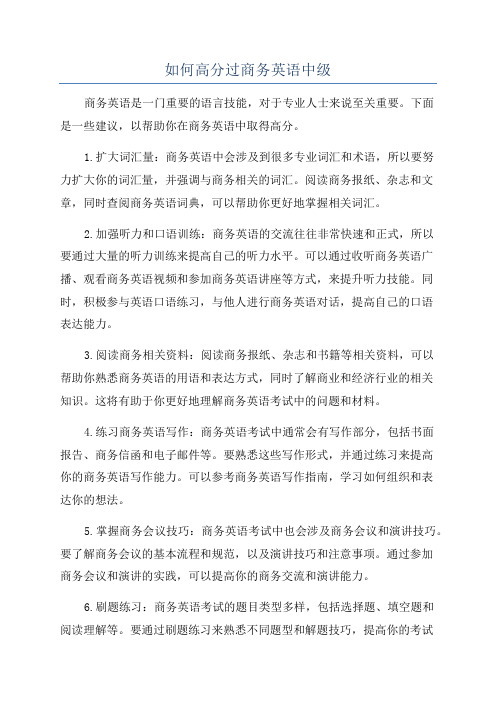
如何高分过商务英语中级商务英语是一门重要的语言技能,对于专业人士来说至关重要。
下面是一些建议,以帮助你在商务英语中取得高分。
1.扩大词汇量:商务英语中会涉及到很多专业词汇和术语,所以要努力扩大你的词汇量,并强调与商务相关的词汇。
阅读商务报纸、杂志和文章,同时查阅商务英语词典,可以帮助你更好地掌握相关词汇。
2.加强听力和口语训练:商务英语的交流往往非常快速和正式,所以要通过大量的听力训练来提高自己的听力水平。
可以通过收听商务英语广播、观看商务英语视频和参加商务英语讲座等方式,来提升听力技能。
同时,积极参与英语口语练习,与他人进行商务英语对话,提高自己的口语表达能力。
3.阅读商务相关资料:阅读商务报纸、杂志和书籍等相关资料,可以帮助你熟悉商务英语的用语和表达方式,同时了解商业和经济行业的相关知识。
这将有助于你更好地理解商务英语考试中的问题和材料。
4.练习商务英语写作:商务英语考试中通常会有写作部分,包括书面报告、商务信函和电子邮件等。
要熟悉这些写作形式,并通过练习来提高你的商务英语写作能力。
可以参考商务英语写作指南,学习如何组织和表达你的想法。
5.掌握商务会议技巧:商务英语考试中也会涉及商务会议和演讲技巧。
要了解商务会议的基本流程和规范,以及演讲技巧和注意事项。
通过参加商务会议和演讲的实践,可以提高你的商务交流和演讲能力。
6.刷题练习:商务英语考试的题目类型多样,包括选择题、填空题和阅读理解等。
要通过刷题练习来熟悉不同题型和解题技巧,提高你的考试答题能力。
可以使用商务英语考试的相关教材和题库,进行有针对性的练习。
7.参加培训班或辅导课程:参加商务英语的培训班或辅导课程,可以获得专业的指导和培训。
老师会帮助你诊断并纠正你的错误,同时提供个性化的学习建议和学习材料。
这将有助于你更加高效地学习和准备商务英语考试。
总之,要想在商务英语中取得高分,你需要付出努力并制定合理的学习计划。
通过拓宽词汇量、加强听力和口语训练、阅读商务相关资料、练习商务英语写作、掌握商务会议技巧、刷题练习和参加培训班等方式,可以有效地提高你的商务英语水平和考试成绩。
BEC中级考试听力失分原因及对策研究

BEC中级考试听力失分原因及对策研究李宁【摘要】本文以2014年参加BEC中级考试大连地区的124位考生为研究对象,具体分析了考生在BEC中级考试听力部分失分的主要原因,并且探讨了针对听力考试难点的解决策略及临场应对方法,旨在帮助学生提高听力理解能力,使其在BEC中级考试中取得更好的成绩.【期刊名称】《开封教育学院学报》【年(卷),期】2016(036)008【总页数】2页(P96-97)【关键词】BEC中级考试;听力;失分原因【作者】李宁【作者单位】大连外国语大学高级翻译学院,辽宁大连116044【正文语种】中文【中图分类】H310.42BEC考试,全称为商务英语证书(BUSINESS ENGLISH CERTIFICATE)考试。
主要根据商务工作的实际需要,从听说读写四方面考查考生在商务环境下使用英语的能力。
由于BEC中级考试的难度介于初级和高级之间,较为适中,又可以证明求职者本身使用商务英语的水平,从而成为大多数考生报考BEC考试系列的首选[1]。
近年来,中国大陆地区BEC考试的报名人数以每年300%的比率高速增长,而通过率却相对较低。
在听力、口语、阅读、写作四项中,很多考生听力部分最弱,可谓谈“听”色变[2]。
作为BEC中级考试的难点,听力成绩的高低对考生能否顺利通过考试影响重大。
笔者收集了2014年参加BEC中级考试的大连地区124位考生的成绩单样本,样本的写作平均分为16.81,口语平均分为15.73,阅读平均分为14.06,听力平均分为11.48,听力平均分在四项中最低。
通过对124名考生进行问卷调查,笔者总结出考生在BEC中级考试听力部分失分的原因,并将其分成主观与客观两个层面。
(一)主观原因1.语言问题(1)102名考生表示由于自身单词量不足,听录音时会遇到理解障碍。
对词汇的熟悉和掌握程度直接影响听力理解的过程[3]。
BEC中级考试中考生需掌握的单词量为4 000~5 000词,其中,包含大量商业专业术语,如单独海损(particular average)、货运承揽商(forwarding agent)等词。
英语考试失分情况分析总结(精选10篇)
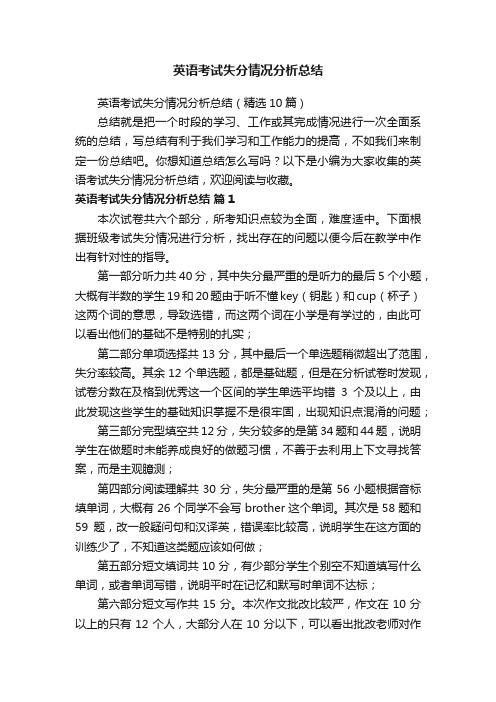
英语考试失分情况分析总结英语考试失分情况分析总结(精选10篇)总结就是把一个时段的学习、工作或其完成情况进行一次全面系统的总结,写总结有利于我们学习和工作能力的提高,不如我们来制定一份总结吧。
你想知道总结怎么写吗?以下是小编为大家收集的英语考试失分情况分析总结,欢迎阅读与收藏。
英语考试失分情况分析总结篇1本次试卷共六个部分,所考知识点较为全面,难度适中。
下面根据班级考试失分情况进行分析,找出存在的问题以便今后在教学中作出有针对性的指导。
第一部分听力共40分,其中失分最严重的是听力的最后5个小题,大概有半数的学生19和20题由于听不懂key(钥匙)和cup(杯子)这两个词的意思,导致选错,而这两个词在小学是有学过的,由此可以看出他们的基础不是特别的扎实;第二部分单项选择共13分,其中最后一个单选题稍微超出了范围,失分率较高。
其余12个单选题,都是基础题,但是在分析试卷时发现,试卷分数在及格到优秀这一个区间的学生单选平均错3个及以上,由此发现这些学生的基础知识掌握不是很牢固,出现知识点混淆的问题;第三部分完型填空共12分,失分较多的是第34题和44题,说明学生在做题时未能养成良好的做题习惯,不善于去利用上下文寻找答案,而是主观臆测;第四部分阅读理解共30分,失分最严重的是第56小题根据音标填单词,大概有26个同学不会写brother这个单词。
其次是58题和59题,改一般疑问句和汉译英,错误率比较高,说明学生在这方面的训练少了,不知道这类题应该如何做;第五部分短文填词共10分,有少部分学生个别空不知道填写什么单词,或者单词写错,说明平时在记忆和默写时单词不达标;第六部分短文写作共15分。
本次作文批改比较严,作文在10分以上的只有12个人,大部分人在10分以下,可以看出批改老师对作文的书写,卷面的整洁以及语句通顺有很高的要求,而能够达到这些要求的学生人数不多。
英语考试失分情况分析总结篇2一、试卷基本情景这套试卷是一套综合型试卷,考核了学生考前所应到达的英语运用综合本事,考核的听力难度系数比较大,词汇方面考核了学生生容易掌握的词汇。
英语单词拼写失分成因及其对策
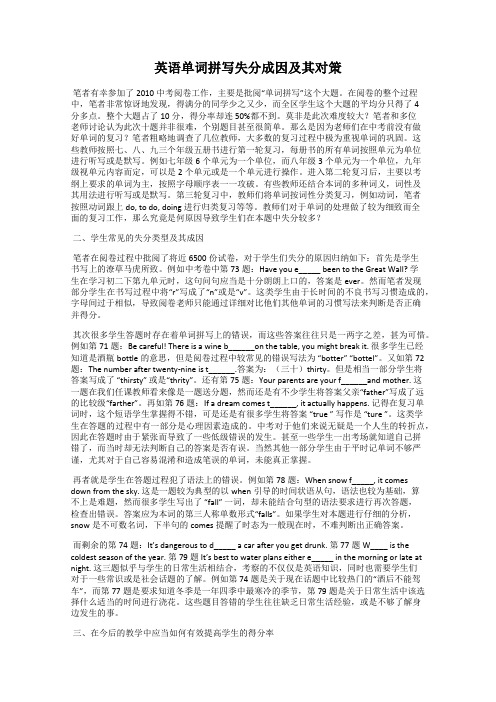
英语单词拼写失分成因及其对策笔者有幸参加了2010中考阅卷工作,主要是批阅“单词拼写”这个大题。
在阅卷的整个过程中,笔者非常惊讶地发现,得满分的同学少之又少,而全区学生这个大题的平均分只得了4分多点。
整个大题占了10分,得分率却连50%都不到。
莫非是此次难度较大?笔者和多位老师讨论认为此次十题并非很难,个别题目甚至很简单。
那么是因为老师们在中考前没有做好单词的复习?笔者粗略地调查了几位教师,大多数的复习过程中极为重视单词的巩固。
这些教师按照七、八、九三个年级五册书进行第一轮复习,每册书的所有单词按照单元为单位进行听写或是默写。
例如七年级6个单元为一个单位,而八年级3个单元为一个单位,九年级视单元内容而定,可以是2个单元或是一个单元进行操作。
进入第二轮复习后,主要以考纲上要求的单词为主,按照字母顺序表一一攻破。
有些教师还结合本词的多种词义,词性及其用法进行听写或是默写。
第三轮复习中,教师们将单词按词性分类复习,例如动词,笔者按照动词跟上do, to do, doing 进行归类复习等等。
教师们对于单词的处理做了较为细致而全面的复习工作,那么究竟是何原因导致学生们在本题中失分较多?二、学生常见的失分类型及其成因笔者在阅卷过程中批阅了将近6500份试卷,对于学生们失分的原因归纳如下:首先是学生书写上的潦草马虎所致。
例如中考卷中第73题:Have you e_____ been to the Great Wall? 学生在学习初二下第九单元时,这句问句应当是十分朗朗上口的,答案是ever。
然而笔者发现部分学生在书写过程中将“r”写成了“n”或是“v”。
这类学生由于长时间的不良书写习惯造成的,字母间过于相似,导致阅卷老师只能通过详细对比他们其他单词的习惯写法来判断是否正确并得分。
其次很多学生答题时存在着单词拼写上的错误,而这些答案往往只是一两字之差,甚为可惜。
例如第71题:Be careful! There is a wine b______on the table, you might break it. 很多学生已经知道是酒瓶bottle的意思,但是阅卷过程中较常见的错误写法为“botter” “bottel”。
- 1、下载文档前请自行甄别文档内容的完整性,平台不提供额外的编辑、内容补充、找答案等附加服务。
- 2、"仅部分预览"的文档,不可在线预览部分如存在完整性等问题,可反馈申请退款(可完整预览的文档不适用该条件!)。
- 3、如文档侵犯您的权益,请联系客服反馈,我们会尽快为您处理(人工客服工作时间:9:00-18:30)。
因为BEC V 失分过多,故痛下决心横比纵比分析得出以下结论,与12月份要奋战BEC V的童鞋共勉。
第一部分:认真听,在听第一遍的时候,把能填上的都填上,第二部分再补足。
单词不必完全写出,这样很浪费时间。
比如customer service,你可以直接写CS.选项填入都是按照顺序的,所以在前面项确定的基础上,着重听空项。
这部分大家可能认为我总结的是废话,但是如果你能全部或者大部分听得懂,那就没多大问题了。
11/29日补充:做第四辑听力的时候猛然发现比第二第三辑难度上升了些,第一部分不再都是肯定的选项了,一般都有两个模糊选项,要听清了内容后才可以论断,之前都是毫不费力地去听,没有去想。
比如我今天听到一题,是关于会议选址的,开始文章出现的是sales training meeting, 后面又出现了一个词sharesholder meeting,平时都是习惯听到什么选什么的,现在真要仔细辨别,看看事情发生的时间。
还有一例,记忆比较深刻,是关于找文件的,其中有一空是填入head office, 开始记录留言的人问是不是将copy件送到公司总部,然后回答是send to my hotel, 又说,you are right, send here.如果前面没认真听,真不知道here是指哪儿。
哎,看趋势,现在真要认认真真地听了才能得出正确答案。
还有一点,我不知道BEC记分时是不是单复数分辨地很清楚,因为我有很多次都没认真听单复数,要是记分真那样严格,就要吃亏了。
第二部分:很多人都觉得这部分很难,确认是,但是我发现你可以根据选项来判断,你是需要听完整的一段,还是着重听每题的后半部分。
判断结果如下:如果你发现选项是要得出结果的,你就应该着重听试题的后半部分,因为开始好多字句都是迷惑人的。
比如说,你接受现在工作的原因是什么,选项会有公司知名度大,公司和住处离得近,公司可以提供外出机会,公司提供的薪水诱人等。
另外就是要完整听完一段的,比如从一段对话中来找出谈论文件的名称,有Invoice,recepit,cheque, packing list等。
这个你就要知道这些纸质文件的功能,比如Invoice是要给客人请款的,packing list是装箱报关用的。
11/29补充第二部分难度也上升了,之前A-H选项都是短语,也有偶尔句子,但是现在一看字数都是几乎是一句话的长度,听力的内容也长了,我有留意现在每小段都是1分20秒,之前大多是1分钟左右。
所以有必要划关键词。
于此同时,还是要主要听力内容中的关键词,我经常会出现两个模糊选项选错,如果颠倒就正确了,所以还是要区分两个短语直接的差别。
今天听到一个特别郁闷,第四辑TEST2 听力中的PART2第二部分,13题中的关键词是put the interviewees at their ease,17题是allow time for applicants to find out the things that are relevant to them以及making them feel comfortable,对应的选项是13helping the applicant to relax;17giving the interviewees a chance to ask questions. 还有一点就是首先要弄懂选项的意义,不然是很难猜的。
第三部分:首先要确定是一个人读还是两个人读。
一个人的演讲或者报告会很长,而且会读的很快,这个时候你要主要他停顿的地方,停顿的地方一般开始一道新题。
听完一遍后,大体知道内容对应的选项,这样第二遍才会有重点的去听。
二个人的讨论,我觉得还比较好,一般首先是各自介绍下,然后是一人发表一个观点,一个观点对应一个选选项,两人的听力内容对应的选项一般都是间或的。
好啦,以上我鄙人的粗见,希望对大家有帮助。
11/23补充黑字部分我在做完第二辑真题听力时候的总结,现在我做完了第三辑(不过T4还差听力),做题思路会有一点点变化。
第二部分详解在听题头阶段,将A-H选项全部看懂,将有同样词汇的短语作记号,重点听。
然后在草稿纸上分辨将题序号写上13____,14____,15____.16____,17_____.开始做题,将自己有确定选项的答案直接写在试卷上,如有有两个疑似选项也请写上,如果整个一题完全听不懂,将听到的只言片语都记在草稿本上。
听耳边开始确定答案,同时重点听第一遍“听不懂”的选项。
之所以用草稿本记下不确定主题的选项是因为5端对话连接太近,没有人听完一遍还清楚记得那些句子是对应哪个题号。
阅读:阅读分五部分:part1:句段配对。
就是给出7个句子和四段文章,将其配对。
Tips:1. 对文章进行信息归类;2. 对七个句子的内容进行归类;3. 正确答案和文章不是字面上的一一对应,而是意义上的等同。
PART2选句填空。
共5题。
一篇文章中间空出几句,根据下面的选项选出合适的句子使文章完整。
Tip:注意空白处的上下文,注意连接词。
做完后最好再通读一遍。
PART3阅读理解。
同四六级中的阅读理解。
一般文章有六段,每段对应一个问题。
问题是按顺序的,即第一题答案在第一段,第二题答案在第二段。
Tip:关键是找依据,可以在关键词下面划线(试卷上可以随便写,随便划,不会有人看的,剑桥只管答题卡)。
PRAT4完形填空。
跟四六级的完形填空相同。
但相对简单。
因为是老外出的题,不像中国人喜欢咬文嚼字。
考的都是固定搭配,常用结构,及助动词的用法。
PART5改错。
这跟四六级的改错有所不同。
只有两种情况,要么是对,要么是多一个词。
不会有其他情况。
关键:切记要看一整句,忌讳只看一行。
多词主要是介词,BE动词,冠词等一些小词。
听力:分三部分。
PART1是三个小对话,每个对话填四个空。
共12题。
PART2是两题。
每题7个独白。
选正确的选项。
共10题。
PART3是长对话或者独白。
共8题。
试卷发下来一定要提前看一下。
这样听的时候容易些。
PART1:Tips:1. 对话一般有6个回合,其中前两个回合多是打招呼,或者说明情况的,最后一个回合是感谢或者拜拜的,这些基本都是废话。
正确答案往往在3-5回合。
所以开头没有听清楚的同学千万不要紧张,不碍事的。
2. 一般是一句话中只填一个空,不会出现一句话要填两个空的情形。
所以,如果你一下子听了两个答案,必然有一个是干扰项。
3. 听之前最好先predict.即看了提示想一下这个空会填什么?比如on后面的空很有可能是时间或者地点。
4. 注意词尾。
包括ING,ED。
如果你已经听出正确答案,而忘记加S或者ING,那就太可惜了。
这点很重要,我们开始听的时候都会犯这样的错误。
5. 填的词语一般是原文出现的词。
不要凭自己的想像。
切次不会超过2个。
所以如果你填了3个或者以上都是错误的。
不过有时候会出现这种情况、比如你听到:a new job那么这时可以只填a job.PART2:一般分两种题型。
一个是内容题。
即要求你总结说话者的内容。
二是观点题。
即说话者的opinion。
Tips:1. 审题很重要。
如果不审题,就会感觉每个选项都是正确答案,因为都讲到了。
所以要审题,看题目要求的是什么。
2. 了解选项。
比如某JOB的职责。
3. 与原文一致的直接排除4. 注意说话者的语气5. 注意key words6. 注意转折性的连词,尤其是but however.正确答案往往在后面。
还有就是强调句。
PART3:内容以interview为主。
一问一答。
Tips:1. 题目是按行文顺序的;2. 提干在对话中往往是近以表达;3. 注意转折。
和强调句。
作文:分两部分。
PART1是小作文,40-50字,以MEMO和EMAIL为主。
PART2大作文,通常是REPORT 或LETTER。
140-150字。
注意按格式,信息完整就可以了。
老师说BEC中的KISS原则:keep it simple and short!这里提供给大家点有用的东西:Reading第一题是配对吧,我的解题方法是,先把各个选项的句子看一遍,划出关键词,然后看ABCD四个选项也是划关键词,主要是把前面选项的句子变形下放入到句子里。
这个做真题的时候也是一样的,如果错了一定要好好理解之后再看一遍,不然不要放弃,知道你理解为止。
这个题应该也算是简单的,有事错一两个。
这个具体方法可以参考新东方的视频,我貌似有点讲不清楚了,悲剧,本人口才不好。
第二题是选词填空,首先还是看选项,看整个句子的意思,然后再短文中看空格部分的前后句的意思,主要是前后两句,然后根据意思来选择适当的句子。
很多人认为这个部分很难,其实我觉得这部分是不一定的,平时做真题的时候感觉不好,错一两个,但是考试的时候本人感觉非常好,有信心是全对的。
第三题是阅读理解,我们中国的学生最擅长的,这里我就不阐述了。
第四类题是完形填空,这个也算难,主要还是看词汇的积累的,这里词汇用法那本书的优势稍微出来一点,平时做真题的时候一定要注意积累,词和词的用法是有小的区别的,这个题总结下来就是积累。
第五类题目改错吧。
这个有点难度,至少我是这么感觉的,不过只要语法基础好,这个不是很大的问题。
结果我考试的时候没时间,最后三个空那了。
悲剧。
Listening:个人是感觉非常简单的题目,基本上就一个没听出来,其他全部都有结果,但是我去考试的时候,可能运气比较好,都听出来了,但是不知道做对了没有。
呃。
很多人说由于学校不同听力设备也不一样,我在南师大考的,设备是每个人一个收音机和一个耳机,效果很好。
听力其实没有什么技巧的,就是要多听,特别是第二部分,要注意力集中,我是闭眼听的,这样注意力会集中一点。
平时做真题的时候就按照考试的模式听,多练,把有的真题都听,力争每一题都能听出原话。
平时去图书馆的路上没事就听听,很随意的。
Writing:这个部分可以说是很死的,断作文的话直接学生用书上有很多的例子,我都是看上面的,记点很地道的句子。
看看相关题材的作文范文,还有就是真题后面的范文,都不错,考试前一天也可以看看,效果好。
第二部分的长作文也没什么技巧,平时学生用书上有写作的题目,尽量要模仿着写,这个很重要,然后和范文对比下,找出别人好的句子,记下来。
下次继续这样。
积累就多了Speaking:这部分是我最怕的,因为南师大这边是随机抽取两个人的,一票子人在一个教室,老师在讲台上随即点两名,由于大家知道考试的男女比例不平衡问题,结果报道两位都是男生的,一定要换一个女生,老师说男女搭配干活不累。
囧。
结果进去的时候紧张过度,但是很是硬挤挤出来了,即使你对不上主题,也要随便编点其他的,但是不能出现语法错误。
结果我说完的时候,那俩老师再传纸条,我紧张了下。
囧。
这个部分呢,可以说是最简单也是最难的,这个就要多练。
